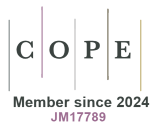Downloads
How to Cite
Faccendini, P., Cantillo, E., Fanizza, C., & Grazia Celeste, M. (2017). Drug utilization of biological drugs in the treatment of chronic Immune-Mediated Inflammatory Diseases (IMIDs): an observational study on Italian patients: Analisi di Farmacoutilizzazione dei Trattamenti Biologici Nelle Malattie Infiammatorie Immunomediate Croniche: I Risultati di Uno Studio Osservazionale Retrospettivo Condotto in un Centro Ospedaliero del Centro Italia. Global and Regional Health Technology Assessment, 4(1), 208–215. https://doi.org/10.33393/grhta.2017.396
Issue
Section
Original Research Articles
License
Statistics
- Abstract views - 712 times
- PDF downloads - 579 times
Sign up
Browse
banners150
Most popular articles in the last 30 days
-
259
-
201
-
163
-
146
-
118









